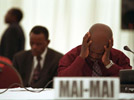
This week the U.S. Institute of Peace hosted an all-day public seminar for policymakers and academics entitled "Economic Dimensions of Peace Negotiation." I presented on Congo’s conflict minerals.
At the sessions chaired by Dr. Raymond Gilpin of USIP, policy practitioners from the U.S. government, professors from the University of Notre Dame and George Mason University, and NGOs debated the keys to involving economic issues in peace negotiations. Financial issues are frequently ignored in peace processes, which unfortunately often leads to the unraveling of peace accords.
I presented on Congo's Goma peace process (2007-08) and the Sun City Inter-Congolese Dialogue process (2001-2002), both of which were largely political negotiations that left out an important economic dimension of the conflict: the issue of conflict minerals. After these two peace processes, western diplomats believed that all that was needed was implementation of the accords. The reality on the ground, however, was that the armed groups had no incentive to lay down arms, because they were earning hundreds of millions of dollars trading in the 3 Ts (tin, tantalum, tungsten) and gold. The war continued.
The peace process is changing today with the focus on the minerals trade, but policymakers must go further to have a lasting impact on Congo. In particular, U.S. Secretary of State Hillary Clinton has a key role to play in advocating for strong and timely implementation of the Dodd-Frank law by the Securities and Exchange Commission and developing a certification process with on-the-ground monitoring.
Other presenters included Jennifer Hazen of the University of Texas, Sean Kane of the USIP, and Corinna Gilfillan of Global Witness, among others. Case studies from Sudan to Iraq were discussed within the broader theme of how economic issues have led to mistrust in peace processes.
Over the coming weeks USIP will collate and summarize key themes from yesterday’s events and post them on its International Network for Economics and Conflict for public debate. Following this, USIP plans to publish a toolkit on economic dimensions of peace negotiation, which will contain a framework for engagement and analysis.
Photo: A representative of a Mai Mai rebel faction buries his head at the Sun City talks aimed at ending the conflict in eastern Congo (AP)

